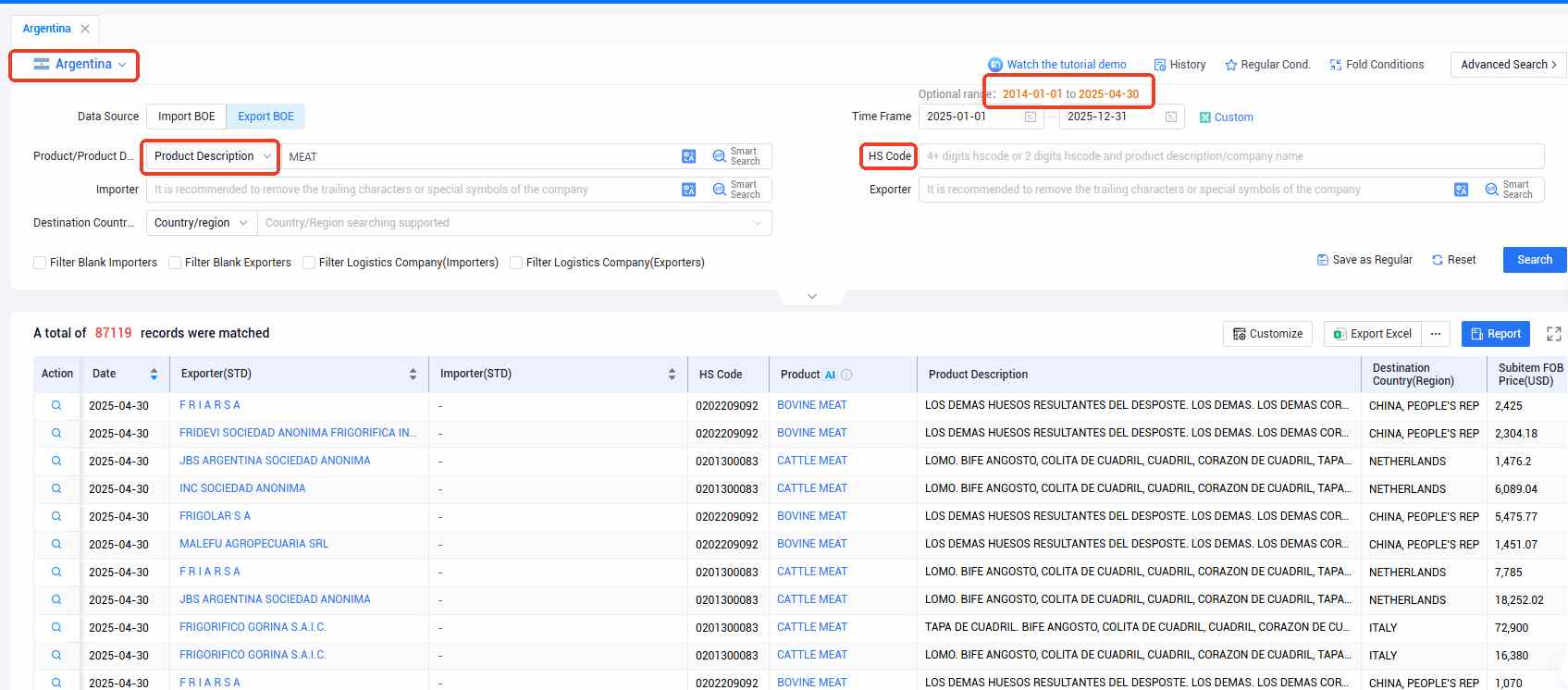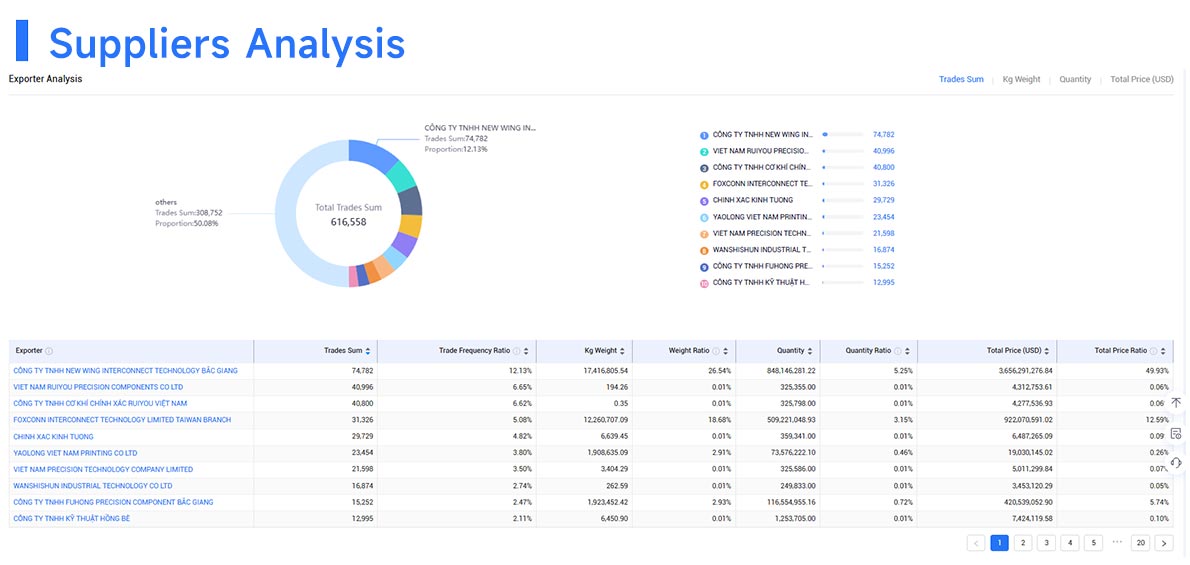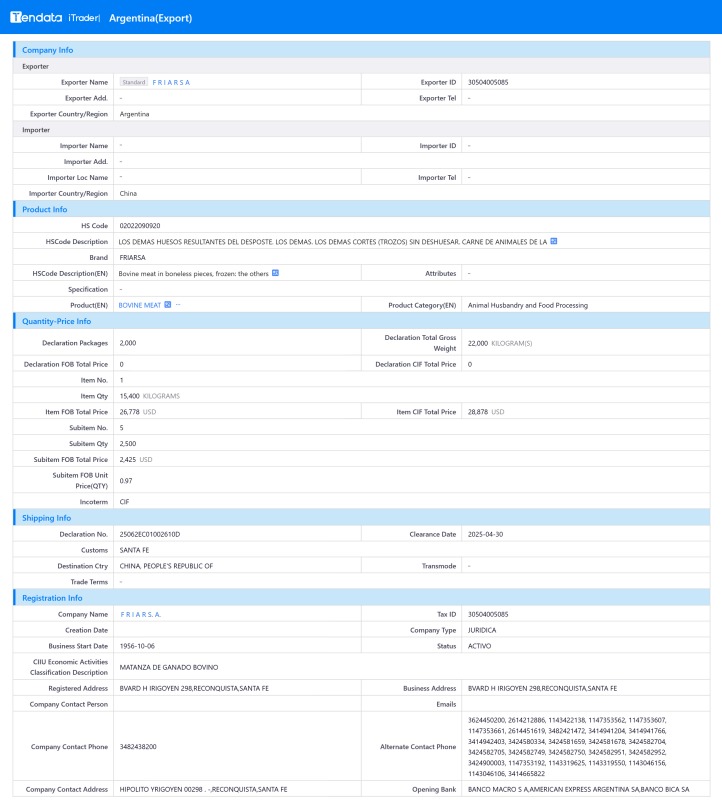 Trade Data
Trade Data
 2025-07-01
2025-07-01
Argentina has a rich history of international trade, with key export sectors including soybeans, automotive products, mineral fuels, and agricultural products. For businesses, policymakers, and researchers interested in tracking Argentina's trade data, there are several platforms and tools that provide access to detailed and up-to-date information about the country’s trade flows, tariffs, and global market trends.

Here's an overview of the best trade data platforms for Argentina in 2025:
1. INDEC (Instituto Nacional de Estadística y Censos)
Website: www.indec.gob.ar
INDEC is Argentina's official national statistics institute, and it provides comprehensive trade data, including monthly and annual export and import statistics, by product and country. Key features include:
Export and import statistics for various commodities, services, and sectors.
Detailed data on bilateral trade between Argentina and other countries.
Economic reports and analysis, including trade balances and customs data.
2. Trade Map (International Trade Centre - ITC)
Website: www.trademap.org
Trade Map, a product of the International Trade Centre (ITC), offers detailed international trade data, including information on Argentina's exports and imports by product and destination. It is highly useful for businesses and researchers who want to:
Analyze Argentina’s trade flow trends by product category, partner countries, and trade agreements.
Access historical trade data and market intelligence for export and import markets.
Identify potential export markets and understand trade barriers.
3. UN Comtrade (United Nations International Trade Statistics Database)
Website: https://comtrade.un.org
UN Comtrade provides access to the most comprehensive international trade database globally. It includes:
Detailed trade data for Argentina by product code (HS code), trade partner, and year.
Historical trade data going back to the 1960s.
Data on imports and exports at a granular level.
>>>> Enter Argentina's trade data platform <<<<

4. Argentine Customs (AFIP - Administración Federal de Ingresos Públicos)
Website: www.afip.gob.ar
AFIP is the Argentine government agency responsible for customs and tax collection. It provides real-time data and reports on:
Export and import statistics, including customs tariffs.
Customs regulations and trade facilitation processes.
HS code-based data on goods traded through Argentine ports.
5. World Bank's WITS (World Integrated Trade Solution)
Website: www.wits.worldbank.org
The World Bank's WITS platform offers an integrated database for trade data, including for Argentina. Key features include:
Export and import data categorized by product and trading partners.
Tariff and non-tariff barrier information for various markets.
Trade-related policies and data analysis tools.
6. Global Trade Information Services (GTIS)
Website: www.gtis.com
GTIS provides detailed trade data on Argentina’s exports and imports, including granular insights by HS Code and trading partner. Key features include:
Real-time global trade statistics.
Trade data segmented by product, market, and value.
Customizable reports and trend analysis.
Why Use It?
GTIS is a commercial platform widely used by companies and analysts for its real-time insights into global trade flows, including those involving Argentina. It's particularly useful for identifying market trends and competitive intelligence.
>>>> Use Argentina's trade data platform<<<<

7. Mercosur Trade Statistics
Website: www.mercosur.int
As a member of Mercosur, Argentina benefits from the trade data platforms and agreements within this economic bloc. Mercosur provides:
Trade data for its member countries, including Argentina’s exports and imports.
Detailed bilateral trade statistics within the Mercosur region and between Mercosur countries and the rest of the world.
Trade agreements and policy information relevant to Mercosur nations.
8. Databank by the Economic Commission for Latin America and the Caribbean (ECLAC)
Website: www.cepal.org
ECLAC provides detailed economic and trade data for Latin American countries, including Argentina. Key offerings:
Annual reports on trade flows in Argentina and other Latin American countries.
Sector-specific export data, including the agribusiness, energy, and technology sectors.
Export and import value trends for regional analysis.
9. GlobalData
Website: www.globaldata.com
GlobalData offers trade and economic insights through industry-specific reports, including data on Argentina’s trade in commodities, manufacturing, and services. It offers:
Comprehensive data analysis for key sectors.
Trade growth forecasts and market intelligence.
In-depth information on export trends, including opportunities for market entry.
>>>> Try Argentina's trade data platform<<<<
10. Tendata
Website: www.tendata.com
Tendata is a global trade data provider that includes Argentina in its extensive trade database. Tendatais particularly useful for identifying global trading opportunities for businesses exporting from Argentina, especially in markets like Asia, Europe, and the Americas.
Key features include:
Detailed import/export data for Argentina with a focus on product-specific insights.
Market intelligence and trade partner analysis for businesses looking to expand into Argentina or export Argentine products.
Conclusion
Argentina's trade data platforms provide valuable resources for anyone interested in analyzing the country's export and import activities. From official government databases like INDEC and AFIP to global trade intelligence tools like Trade Map and GTIS, these platforms offer both in-depth and real-time data to help businesses, researchers, and policymakers stay informed and make data-driven decisions.

Category
Leave Message for Demo Request or Questions


 T-info
T-info T-discovery
T-discovery

 My
Tendata
My
Tendata Market Analysis
Market Analysis Customer
Development
Customer
Development Competitor
Monitoring
Competitor
Monitoring Customer Relationship
Customer Relationship





































































































































